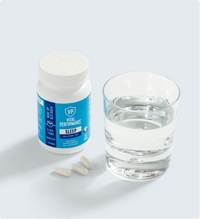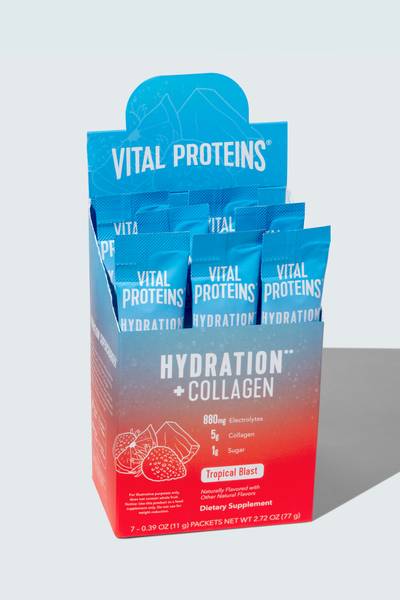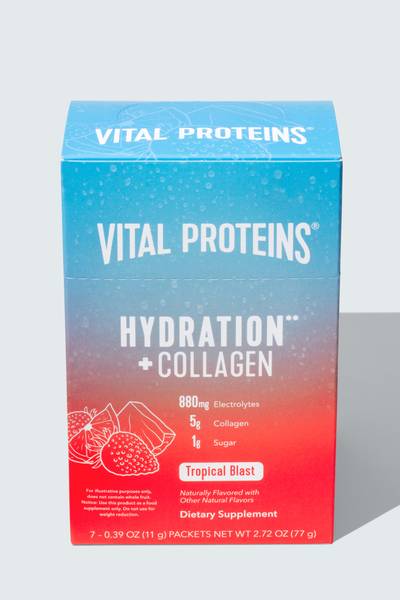It's the summer of wellness and we're all ready to refresh our daily routines. Our new Lively series will highlight all things hydration to help you live a fuller, more vibrant life with every sip.
As the weather begins to warm up, you may find yourself spending more time outdoors in the hot sun. There are several benefits to being outdoors in the sun,from the production of vitamin D to promoting physical activity.
However, we often sweat more in the warm spring and summer months and need to be vigilant about hydration. Since our bodies are made up of about 60 percent water, it's important to prioritize water intake, just as you would other nutrients.
Here, 8 nutrition experts spill their favorite tips on staying hydrated, all summer long.
Vital Note: This article has been made available for informational and educational purposes only. It is not intended to be a substitute for professional medical advice, diagnosis, or treatment. Always seek the advice of your physician or another qualified health provider with any questions you may have regarding a medical condition. Your licensed healthcare professional can best provide you with the diagnosis and treatment of any medical condition and assist you as well in deciding whether a dietary supplement will be a helpful addition to your regimen.
How Much Water Do You Need Daily?
While the old adage of drinking 8 cups of water a day is outdated, we now know that there is no one-size-fits-all formula for daily water intake. The amount of water you should drink depends on many factors, including your body size, age, health conditions, medications, activity status, training status and more.
A good rule of thumb is to take your body weight (in pounds) and aim for half of that in ounces of water per day. For example, a 150-lb. individual should seek to drink 75 oz. of water a day. This is a good baseline but may need to be adjusted if this person is very active, sweats heavily, and/or feels thirsty often.
Another easy way to ensure you're staying hydrated is to check your urine color. Proper hydration will yield a pale-colored urine (similar to the color of straw), while darker, more concentrated urine signals a need for more water, according to the Cleveland Clinic.
Some people are instinctively on board with their body's water needs and thirst status, and consistently refill their water bottles and drink enough without prompts throughout the day. Other people can go hours without drinking any water without feeling anything.
Whichever camp you fall into, it is a good practice to drink adequate water consistently throughout the day in the warmer months to ensure you don’t fall behind or get dehydrated. Staying hydrated is important for the delivery of nutrients, skin health, cardiovascular health, cognition, concentration and more.

Dietitian Tips for Increasing Water Intake
Now that you better understand the importance of hydration, we've consulted with the nutrition experts to hear some of their best tips for staying hydrated.
Snack on Hydrating Fruits and Vegetables
As cliché as it sounds, you're likely to find Registered Dietitians consuming hydrating, water-rich produce options throughout the day, like berries, peaches, watermelon, cantaloupe and cucumber. For an upgrade, Chrissy Carroll, RD, tosses watermelon chunks in a blender with a pinch of salt as a natural electrolyte drink.
Habits Start with Consistency
Kristi Ruth, RDN, always starts and ends her day with a glass of water. She leaves a glass of water on her bedside so it's easy to drink right when waking up, which makes forming a habit much easier. Dietitians always recommend carrying your water bottle with you. If you have it with you, you're more likely to drink from it.
Include Other Hydrating Liquids
Remember that seltzer, iced coffee and iced tea can also count towards your hydration needs. Iced coffee does act as a diuretic for some people, so may require more water replenishment, and shouldn’t be solely relied on for reaching water intake. Lisa Young, Ph.D., RDN, loves to make ice cubes out of watermelon juice to add more flavor to her water.
Keep It Cold
"While I'm working, I keep a big bottle near me so that I see it and remember to drink. Putting a few ice cubes in the water helps to drink even more," adds KeyVion Miller, RDN. Using a straw can also be a helpful tip to encourage a person to drink more water.
Dress Up Your Water
Dietitians love adding fresh produce to their water to jazz it up a bit. Lisa Andrews, MEd, RD, LD, recommends adding citrus or lime, both which help motivate her to drink her water, while Maggie Michalczyk, RDN, recommends lemon, mint and cucumber for a refreshing cool summer drink.
Diana Savani, RD, loves creating a "bubbly water sangria" with seltzer water, fresh herbs and frozen berries to help with her hydration.
Add Electrolytes
"Hydration** + Collagen is a game changer for me as it has simplified my consumption of collagen and my daily hydration (water + pink Himalayan salt) into one simple packet added to water," says Vital Proteins® in-house registered dietitian Jake Kocinski, RD. "Sometimes I'll add a packet to my water in the morning. Or, I'll have it during a tough workout to be sure I'm staying hydrated as well as helping support my bones, joints and tendons!**"
While you're out enjoying the warmer weather, make hydration part of your day.














